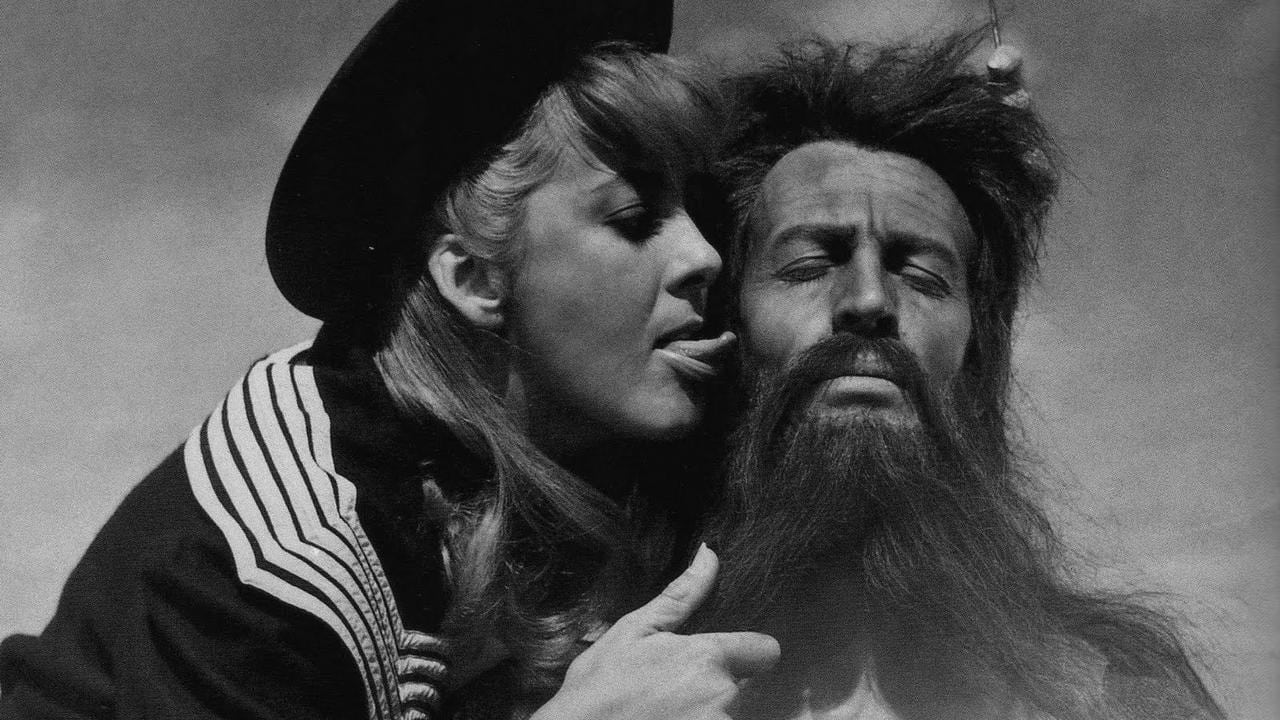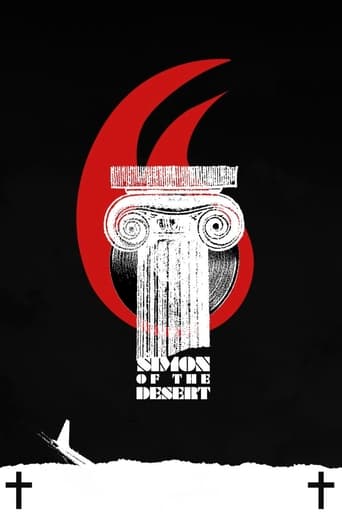Titreenp
SERIOUSLY. This is what the crap Hollywood still puts out?
Spoonatects
Am i the only one who thinks........Average?
mraculeated
The biggest problem with this movie is it’s a little better than you think it might be, which somehow makes it worse. As in, it takes itself a bit too seriously, which makes most of the movie feel kind of dull.
Derry Herrera
Not sure how, but this is easily one of the best movies all summer. Multiple levels of funny, never takes itself seriously, super colorful, and creative.
felixoteiza
The most ironic thing I see in this Buñuel is how strenuously Simon fights his sexual urges, violently awakened in the occasion by a sultry, curvaceous, Devil...while standing on what must be the biggest phallic symbol a hundred miles around. I think such image resumes the best what SOTD is all about: the fact that the farthest we humans think we have gotten away from our own nature—through physical effort, willpower--the tighter we are attached to it. That's the tragedy and comedy of our human condition, that we can't escape our nature, that of being minds and souls striving to reach a spiritual reality while being incapable of escaping our animal trappings, urges. We may expel them through the front door, thought they have gone for good, yet in the meanwhile they have gotten back by the kitchen door. That's, I think, the subject on which Buñuel focused his film, consciously or not--the futility of all asceticism, the lack of meaning of any human search for spiritual transcendence or purity--rather than just trying to mock established religion. Buñuel is that misleading to many; they think for ex. that The Exterminating Angel is about nothing, just a joke, while it really focuses on the mental traps we build for ourselves.Now there's nothing insulting in saying that Buñuel wasn't aware of what he was doing when shooting this or his other films. That's how real genius generally works, with the artist not even realizing what he's doing. True genius is not rational but intuitive. The artist does his artwork in a given way, including diverse elements, some of which apparently shouldn't be there, not because the logical mind tells him to do so, but simply because "it seems right". Such a thing, image, sound, fits there nicely so he'll add it to the whole. It's only when the art wok is complete that is makes sense, or should maybe.SOTD works very adequately that particular no man's land straddling the humane and the divine, between the everyday and the transcendental; something that has always intrigued me, because also an inescapable element of our human condition. For ex., one thing that has always intrigued me is how Man creates--or acknowledges, if you are a believer--the divine only to smirch it, to make it pedestrian in the next step. I'm thinking, for ex., about an old "recipe" for hard boiled eggs--put them in boiled water the time for three Hail Marys. Or wondering how Jesus handled events that usually make any of us fume; for ex, while he was still a kid, helping Joseph in his carpenter shop, did he let go a swear word when he hit his thumb instead of the nail?. That's another angle on which SOTD works; when, for ex., Simon mixes his prayers with trivial comments about his body functions, symptoms; or about the stupidity of someone around, about even the sudden realization that he may be talking nonsense instead of reaching new peaks of wisdom. But the best ex. is that of the thief hitting his kid with his miraculously given back hand. Buñuel's message here is clear: Man can't just handle divinity, transcendence; all he can do is to build mockeries of them. Just like the pillar--phallus on which Simon carries out his futile endeavor.The cinematography here is adequate without being superb--many shots from atop the pillar and the corresponding under it, looking up, as to emphasize the only two possible locations for every character—but we have to marvel at Figueroa's work, when all what he had in front of his lenses was the pillar and the desert. As for direction, Buñuel seems to have given great freedom to his actors, just told them what to do, do a few takes and then select the one he liked better. This is particularly true for Pinal and Brook. One has to admire also the great versatility of Mexican actors, for whom no scene seems to be too shocking, absurd or surrealistic. Both elements together make for great comic moments, amongst others, Simon pompously giving the could shoulder to his mom--his "mission" is far more important--and Pinal's Devil acting as a happy-go-lucky, carefree girl. The ending may be interpreted in many ways, but I think the idea behind it is, how things in life that tempt us--and to which we resist for a time, as Simon does towards earthly pleasures--appear trivial, ordinary once we succumb to them. Pinal herself, a sultry vixen while only a temptation, becomes a regular gal in night clothes when she finally gets him where she wants him. Man can't handle the transcendental I said, because even the transcendental he turns it into the pedestrian.In all a daring, imaginative, if short, surrealistic movie; one that will surely leave an impression on you, whatever that impression may be. Also said to have inspired Monty Python's Life Of Brian. Unfortunately that inspiration doesn't seem to have gone deep enough to make this last go beyond the lame joke and the man-in-drags routine. 8/10.
Emilyjkwin
Make no mistakes, this film directly satirizes and criticizes the Catholic church that Bunuel found himself at odds with. While quite worth viewing, the film is not appropriate for children, nor is it a typical narrative adventure. The film can be quite funny at times, pointing out facets of the church and religion which can be perhaps contradictory. While it seems ridiculous, it so happens that people actually did get on top of pillars and prophesize/sermonize, the irony being that the people were being looked down upon by the pillar prophets. Not all viewers will appreciate the cutting humor or satire of the film. In the film the devil is represented by a woman. The woman who is Satan is often tempting Simon, topless, or is all of a sudden an old and undesirable hag of a woman, without missing a beat. The devil taunts Simon in humorous ways, at one point punting a lamb. While it felt that the film moved a smidge on the slow side, it is cut short as the director ran out of funds for the production. The ending is abrupt, but still resolves the plot, which is untraditional, yet intelligent and sophisticated. The film is not for the average audience, but is a favorite among film scholars and cinephiles. Younger film scholars should perhaps view the film multiple times to get the full effect of the film, as it requires full attention to catch the subtleties included in the plot. The film's title may present itself like a sword and sandal film, but is in fact completely unconventional in its execution. There are plenty of sandals in the film, few swords to be found except those used to form metaphors and satires of idiosyncrasies. For example, Simon, who is considered to be most holy, refrains from interaction with the public, and is withdrawn from people and overall temptation. However, it is quite ironic that he still retreats to the devil in the end, where he is transported to a club where people are dancing. While Simon is among people who are dancing in a trance like matter, devil present, Simon still continues to opt out of participation or interaction, yet he has technically given in to temptation anyways.
parkermenn
Most Christians, today, go to church (some tithe), they say prayers (usually not enough of them), they try their best to be good Christians and live life like the bible and our preachers teach us to (but not all read the bible consistently or go to church consistently). Very few Christians, that I know of, fast. I think it is safe to say that nobody in the world is attempting something like Simon by standing on a column for almost a decade. With today's media, something like that would have already gained world wide attention and publicity.Everybody has temptations to deal with, but they are in the form of the world and the desires that are in the world. If anyone claimed that Satan was torturing them, they would probably be considered insane. Simon is so well disciplined he is not tempted in normal ways. The way Simon is set apart from other Christians makes it believable that it would take Satan himself to tempt Simon and cause him to stray. I think this makes for a very good movie. We get to see Luis Bunuel's version of Satan as a temptress. We also see how devoted Simon is. He treats everybody the same and rebukes even holy men.I think Satan is sent by God (or allowed by God) to tempt Simon because Simon has surpassed normal temptation. Therefore, temptation of a higher degree (for lack of better words) must come to Simon to test his perseverance and build his effectiveness as a Christian even further. This is the basic premise for making an effective Christian. They go through trials or hard times, but with the help of God (by trusting God and taking cover in God's refuge) they overcome, persist and persevere.I thought the ending was neat. Satan takes Simon on a journey that takes them to a club of some sort. Simon is being shown the world outside of his normal column and what it is becoming. The youth dancing to vulgar music. To the normal person the youth or the music do not seem vulgar. But, to Simon the whole scene stinks of the devil's schemes of subversion. And, the devil loves the revelry.
Kerrie (FightinTexasAggies)
Although this movie seemed a bit weird and strange to me, overall I really enjoyed it. If it had not been for the comedic humor evenly placed throughout the film, I do not think I would have liked it as much. To me, the humor is what made the film stand out.Luis Bunuel is an amazing director full of ideas and symbolism. Throughout the film Simon is constantly being tempted by different things that symbolize the devil. Trying to stay true to God, Simon keeps trying to resist. The devil comes to Simon in many different forms, for example, as a sexy seductress and as an old haggish looking lady. All of the ways in which the devil tried to take over Simon seemed to be very eerie. The end of the movie is where I became confused, just when you think that Simon's prayers to God would not be answered, the film all of a sudden switches to a disco-like scene with everyone partying and dancing around. In this scene you can also tell that the devil never left because it is there with him yet again, but in a different form of another seductress. I took this as a parallel to life and how evil never truly escapes wherever you are. At first, this scene lost me but after thinking about it I began to realize maybe why Bunuel did this. Overall this film was great, as long as you do not hold your religious views to be very strict and serious.

